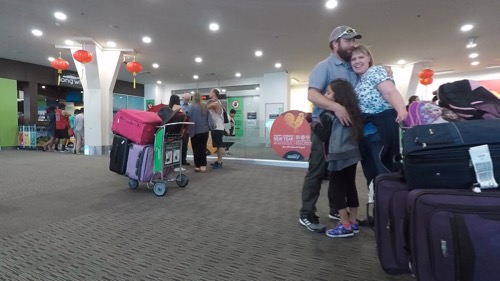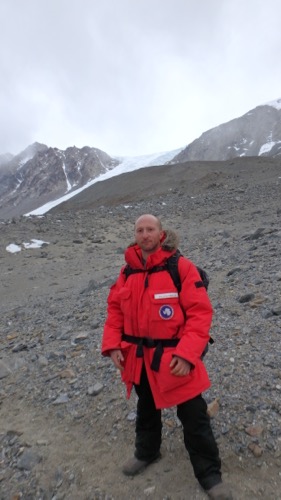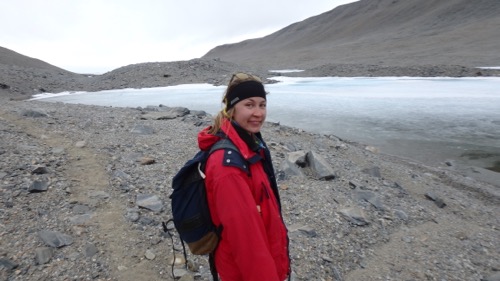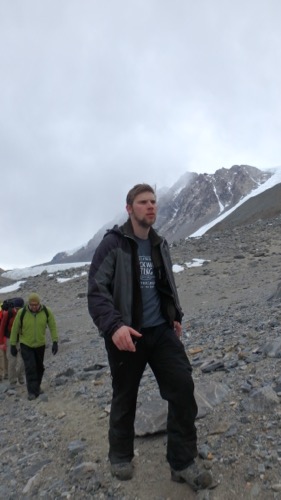My PolarTREC adventure is coming to a close. My family flew into Christchurch today and we had a happy reunion at the airport. We are going to spend a few days together in New Zealand before returning to our daily lives at home in Utah. It feels so good to be with them, especially since our typical family time during the holidays was cut so short this year. They have been great at supporting me during this expedition. This is our first time outside of the United States as a family and we are excited for this new adventure.

I know for many of my students back home they are looking towards graduation in a few months and wondering what their next steps are. They will soon be embarking on their own new adventures. I thought it would be nice to have a few members of our team recount their experience getting to where they are at now and their plans for the future. I asked Walter Andriuzzi, Ashley Shaw, and Andy Thompson a few questions. I think their responses will illustrate that your years in high school and the first years of post-secondary education are a time of exploration. A broad range of experiences can help you decide what to do in your career. Even when you think you have decided on a path, it helps to be flexible and open to new experiences so you can find something you are passionate about.



1. What was the path (i.e. education and career) you took to get where you are now?
Walter – I’ve always wanted to study nature. At the university in Naples, Italy, I studied a broad range of disciplines, such as geology, botany, zoology, palaeontology, and ecology. I became interested in soil ecology after a laboratory class, and for my thesis I studied soil mesofauna (springtails, oribatid mites, etc.). Next, I went to Scotland for a Master of Research in Ecology, and again I went belowground for my final project, which was about how herbivores and seabirds affect the soil food web. Determined to pursue a research career in soil ecology, I embarked on a PhD project in Ireland and the Netherlands, to investigate how earthworms regulate soil structure, nutrient cycling, and plant growth. After my PhD I became a postdoctoral researcher at Colorado State University, where I currently study the soil ecosystems of the McMurdo Dry Valleys, Antarctica – for example how soil invertebrates in this ecosystem respond to climate.
Ashley – I went directly from high school to college at Bellarmine University, where I majored in Biology and English. I thought I wanted to be a medical doctor, but soon learned that I preferred to learn about how nature works rather than how the human body works. During college, my advisor, Dr. Anthony Lentz, helped me to do some small research projects on caterpillar feeding. This is where my passion and interest in ecology research really began. I then started applying to graduate schools for ecology. I was accepted at Colorado State University where I completed a masters degree in ecology. I am currently pursuing a PhD at CSU.
Andy – As a kid, I’d always wanted to be a scientist – at first I thought I’d be a paleontologist, but then I think sometime in middle school I realized they didn’t get paid very much and had to work in the heat all day long (I don’t like the heat). So then I decided I’d be a cosmologist and study the foundations of the universe – turns out that I wasn’t great at math and I decided I wanted to help people somehow. By the time I started my freshman year of college, I decided to major in microbiology. After I graduated I started a master’s degree in a lab that studied aspects of microbial ecology, evolution and extremophile research, all things I had found interesting as an undergraduate. I quickly switched to a PhD though – I decided I didn’t want to spend more time in school than I had to, and the PhD would give me experience and credentials that a Master’s couldn’t. That was almost four years ago, and I’d have to say I’ve learned a lot during my graduate work, both about myself and about how to think, which has been extremely rewarding and valuable.
2. What excites you most about your research?
Walter – The Dry Valleys are so harsh, so different from any other environment I’ve studied, that it amazes me that soil invertebrates can survive there. Surprise and wonder at nature have always been at the core of my research. There are also other aspects – for example, by studying how soil nematodes in the Dry Valleys respond to climate change, we can develop ideas to test in more complex ecosystems – but the fundamental driver is definitely curiosity.
Ashley – I am very interested in figuring out how stuff works. Each time a question is answered, the research is not complete. Instead, there are many more new questions to explore. This process is like a big puzzle that keeps me interested and excited.
Andy – What I like most is thinking about how seemingly disparate concepts connect and reveal surprising truths. I enjoy challenging the accepted view of a concept and proposing new ways to understand it. I also like visualizing the microbial world, and exploring the “what-ifs” of the natural world’s mechanics. The more I learn about these topics, the more I get to do that.
3. Where do you want to end up in your career?
Walter – I don’t have long-term plans for my life yet, but for the foreseeable future I want to keep doing research in soil ecology.
Ashley – Ultimately, I would be happy in any career that keeps me learning and exploring. Currently, I think that career will be as a university professor where I can teach science and continue research.
Andy – One of the most profound insights I’ve had as a PhD student is that I don’t like research. To be honest, I don’t know what to do after I graduate, but I do know that I probably won’t do research or go on to become a professional academic. I’ve struggled with this for a while, knowing that I would prefer a different career but not knowing what else to do. I’ve decided that if I don’t try though I’ll never know and I’ll be stuck someplace where I don’t want to be.
4. Share any advice you might have for successfully pursuing a science career (or more general advice if you want).
Walter – Be curious, inquisitive, open to wonder. Pursue knowledge for its sake, not just to get good grades. Learn to manage your time, and don’t be unsociable: friends and interests beyond school/university should not get in the way of your studies, but should not be given up either. I had excellent mentors during my master’s and PhD studies, and while they all are committed, hard-working scientists, they also enjoy some hobbies and spend time with their loved ones. They are also humble, and kind to their students and colleagues; being cold and arrogant may be typical of scientists in movies, but it won’t make your life any easier in research.
Ashley – My advice for anyone interested in a science career: go outside frequently and keep a journal.
Andy – I have two pieces of advice, one general and one specific to science. The first is to spend time getting to know what it is you like to do and what it is you’re interested in, because they aren’t necessarily the same thing. Experiment a little bit with different options, don’t run headlong into a path just because it sounds great. One thing that concerns me is that students nowadays have very little time to really get to know themselves, and are instead too busy trying to complete all of the tasks they’ve been assigned. The second piece of advice I have is whatever you choose, commit to it all the way. Being successful at whatever you love doing is possible if you really put your heart into it, but it takes work and time. Being patient enough to work your way into something that suits you is key, so make sure to always remember your goal even if the going gets rough.
- < prev
- 37 of 37


Comments